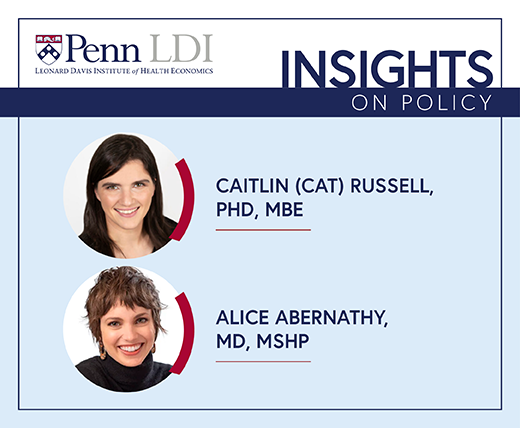
Penn LDI CICADA Initiative Names Researchers for 2025-2026 Cohort
Eighth Year of Program That Recruits, Mentors and Develops Junior Faculty for Health Services Research
News

Princeton Professors Frances Lee and Stephen Macedo’s new book, In COVID’s Wake: How Our Politics Failed Us, is a critical examination of the role and failures of the so-called “laptop elite” in science, government disaster management, public communications, and journalism during the pandemic. The “laptop elite” refers to highly educated managerial professionals who were able to work remotely from home as they created, implemented, and managed the policies and practices designed to respond to and contain the deadly virus that ultimately killed more than a million Americans.

Published in March, exactly five years after COVID-19 was officially declared a U.S. public health emergency, the book portrays the various pandemic responses executed by these elite professionals as flawed by overconfidence among experts, suppression of dissenting views, and politicization of science. The authors fault how public health measures such as lockdowns, mask mandates, and school closures were implemented without sufficient consideration of the broad social and economic impacts—particularly in disadvantaged communities and among large populations of service workers, tradespeople, and others who could not work from home.
Macedo, PhD, is a Professor of Politics at Princeton’s Center for Human Values, and Lee, PhD, is a Professor at Princeton’s School of Public and International Affairs. Both are highly respected experts in government policy and political research and were the featured speakers at a University of Pennsylvania Leonard Davis Institute of Health Economics (LDI) policy seminar on May 8. The event was moderated by LDI Senior Fellow Mark Neuman, MD, MSc, a Professor of both Geriatrics and Epidemiology, and Director of the Penn Center for Perioperative Outcomes Research and Transformation (CPORT).
The event was co-sponsored by LDI, the Penn Center for Clinical Epidemiology and Biostatistics (CCEB), the Andrea Mitchell Center for the Study of Democracy, and CPORT, and supported by the Charles C. Leighton, MD Memorial Fund.
As Macedo opened the session, he noted that the book captured how “the pandemic revealed and contributed to the degraded state of liberal democracy, especially the truth-seeking departments of liberal democracy: science and journalism. It underscored the need for universities to be independent for the sake of being able to pursue difficult questions and the best possible answers. Our book acknowledges the influence of polarization and politicization and a tendency toward moralized disagreement and intolerance of dissent.”
Lee said they “were troubled by the fact that our book has to come out in this environment. It was written before the presidential election. We had no idea what political circumstances would be greeting us when the book finally did come out. It has been less than ideal.”
Macedo emphasized, “We have many colleagues focusing on the dangers of right-wing authoritarian absolutism, and we’re not dismissive of that at all. But we thought we had a distinctive contribution to make with respect to the shortcomings of our own tribe, because we believe in educational institutes, we believe in science, and we believe in journalism. And we think it’s necessary for us to examine our own shortcomings when it comes to these matters. That’s what the book attempts to do.”
Some of the main points of the 390-page book:
• U.S. COVID response actions at the federal and state level essentially ignored extensive pre-pandemic preparedness plans created in the previous decade to guide the response to any future respiratory pandemic.
• The science of crafting effective COVID response strategies quickly became deeply politicized, with dissenting experts’ voices and reasonable debate often sidelined or stigmatized.
• State and federal government agencies operated without clear goals or effective communication and failed to consider the scope of the collateral damage their policies did to public trust and institutional legitimacy.
• Sustained nation-spanning misinformation campaigns and levels of unprecedented political division created a “fog-of-war”-like environment in which it was often difficult or impossible for either citizens or public health officials to know what to believe or respond to.
• Hard policy choices were often distorted or obscured by slogans like “follow the science” that were used as gimmicks enabling leaders to avoid responsibility and public debate.
• Enacted policies tended to benefit professional managerial people as they remotely planned and executed the questionable response policies that resulted in the inequitable distribution of harms for the essential workers and less-privileged families that bore the brunt of pandemic hardships.
• The institutions tasked with finding and conveying relevant factual information to the public—such as the media, scientific bodies, and academic researchers—struggled to maintain open, critical dialogue and frequently prioritized easy consensus or political expediency over honest inquiry.
• Vaccine policies were promoted with claims that exceeded the available scientific evidence in a way that contributed to confusion and public skepticism.
The Trump administration’s 2020 disregard of earlier federal and WHO pandemic response plans may be one of the least known but most important issues of that period.

Macedo explained: “The WHO plan in 2019 emphasized the uncertainty around the whole suite of non-pharmaceutical interventions that would be imposed within a few weeks,” he said. “This included mask wearing, social distance measuring of all sorts, school closures, border closures, contact tracing and so on, except for the medications and vaccines. That same report cited other measures that were not recommended in any circumstance, including contact tracing, quarantine of exposed individuals, entry and exit screening, and border closures. The reports considered the evidence base for all of these measures and rated them as being supported by very weak evidence.”
“One of the other things emphasized in the pre-COVID plans was that in spite of the absence of evidence of the effectiveness of these measures, political leaders would be tempted to use them to demonstrate that they were in charge. The reports emphasized that public health officials, scientists, and public leaders like governors had to be frank with the public about the absence of good evidence, as well as both the certainty of costs associated with these measures and the uncertainties regarding benefits,” Macedo said.
Lee pointed out that “governors were the most important policymakers during the pandemic because federal officials played advisory roles. It was the governors who had quarantine power and the other regulatory powers central to the response. But governors had no prior experience governing during a pandemic and the guidance available to them was contradictory and unclear.”
Lee said the analysis done for the book project found that there was a strong relationship between a state’s level of vaccine uptake and its COVID mortality rates with the least vaccinated state experiencing 1.6 times the COVID mortality as the most vaccinated state.
But a striking finding was that the various non-pharmaceutical policies pursued by state governors before vaccines became available did not have a close association with COVID mortality rates during the period.

“Imposing stay-at-home orders more quickly did not make a difference in mortality outcomes,” said Lee. “States that kept schools closed longer did not fare better in COVID outcomes than states that reopened schools more quickly. The Oxford Stringency Index showed that states imposing more stringent COVID restrictions did not far better than states with less stringent restrictions.”
Another topic of the book was the flood of misinformation and withheld information of various kinds that came to characterize the pandemic environment. Macedo pointed to officials withholding information of the possible lab origins of the virus and related National Institutes of Health (NIH) funding.
“The head of NIH said neither NIH nor National Institute of Allergy and Infectious Diseases (NIAID) ever approved any grant that would have supported gain-of-function research on coronaviruses that would have increased their transmissibility or lethality for humans. This wasn’t true,” said Macedo. He cited David Zweig’s book, “An Abundance of Caution: American Schools, the Virus, and a Story of Bad Decisions,” for reporting that the NIH gave millions of dollars to a U.S. nonprofit called the EcoHealth Alliance that had a research partnership with the Wuhan Institute of Virology in China.
“Grant applications to the NIH from EcoHealth explicitly spell out work involving the creation of deadlier and more transmissible pathogens. It said researchers would use infectious clone technology and mice to test the ability of newly created viruses to infect humans,” said Macedo.
Macedo said the Lancet published an article in February 2020, strongly condemning conspiracy theories suggesting that COVID-19 was not of natural origin and that the 27 authors of the article declared no competing interests—but one of those authors was head of the EcoHealth Alliance.
In the larger overall picture of the evolution of pandemic response measures, Macedo said “roughly speaking, a consensus developed in April 2020, and dissent on the issues became very unwelcome. There was an insistence on ‘wartime unity’ and dissent was the first casualty. That resulted in faulty leadership, moral failures and insufficient humility about the lack of evidence for the measures being rolled out. Elite failure included too much power given to narrow experts, premature closure of deliberations, and moral bias.”
One of the primary concerns of the book authors is the consequences of the great American COVID Lockdown that can be seen in school children whose levels of learning are still depressed, cities whose downtowns have not yet economically recovered, and the hostile government distrust that fuels so much of today’s politics. This issue tracks back to the earliest days of the pandemic and the 2020 scientific struggle over which of two dramatically different philosophies would define the public health COVID Response—the draconian physical lockdown of society, workplaces, the economy, and schools, or the far less restrictive policies of the Great Barrington Declaration that was defined in an open letter from epidemiologists at Oxford, Stanford, and Harvard universities.
The Barrington Declaration argued against broad lockdowns in favor of a “focused protection” strategy that included strong measures to shield the elderly and people with pre-existing health conditions but had minimal restrictions for healthy individuals who would be allowed to pursue normal life, school and work functions. The Declaration claimed that allowing the virus to spread among the low-risk population would enable herd immunity to develop more quickly, eventually reducing the risk for everyone. The Declaration’s principles were quickly condemned out of hand by many scientists and public health organizations as dangerous and unethical.
But Macedo pointed to prominent dissenting scientific voices like David L. Katz, MD, MPH, who achieved little traction in the debate. In a New York Times opinion piece in March 2020, Katz wrote: “I am deeply concerned that the social, economic and public health consequences of this near total meltdown of normal life—schools and businesses closed, gatherings banned—will be long lasting and calamitous, possibly graver than the direct toll of the virus itself. The stock market will bounce back in time, but many businesses never will. The unemployment, impoverishment and despair likely to result will be public health scourges of the first order.”
Moderator Neuman asked Macedo in hindsight, what future policy-framing structure would provide a more robust and meaningful debate and decision-making process in these kind of national emergency calls of the moment?
“I would cite the fundamental values of liberalism and science, which include being open to criticism and, ultimately competing points of view,” said Macedo. “I think the scientists who had substantive opinions needed to be assessed, a lot of them representing the Great Barrington Declaration proposal that advocated for a suite of policies more like Sweden. Those policies were also more consistent with the pre-COVID pandemic preparedness plans of the Bush White House and the WHO. They should not have been dismissed in the way that they were. We need a process that allows the strategy to be questioned. We need a devil’s advocate to help us consider whether certain measures make sense, rather than a ‘wartime unity’ that’s intolerant of scientific dissent.”
“If you’re a public health person, you have this very narrow view of what the right decision is,” Macedo continued, quoting NIH Director Francis Collins. “And that is something that will save a life. It doesn’t matter what else happens. So, you attach infinite value to stopping the disease and saving a life. You attach zero value to whether this totally disrupts people’s lives, ruins the economy, and has many kids kept out of school in a way that they never quite recover from. This is a public health mindset, and I think a lot of us involved in trying to make those COVID recommendations had that mindset.”


Eighth Year of Program That Recruits, Mentors and Develops Junior Faculty for Health Services Research

Comment: Submitted to the U.S. Department of Veterans Affairs

Comment: Delivered to the U.S. Department of Labor
Less Than 1% of Clinical Practices Provide 80% of Outpatient Services for Dually Eligible Individuals

From Anxiety and Loneliness to Obesity and Gun Deaths, a Sweeping New Study Uncovers a Devastating Decline in the Health and Well-Being of U.S. Children

Chart of the Day: National Study Shows White Patients More Likely Than Black Patients to Get CT and/or Ultrasounds for Abdominal Pain in the Emergency Department